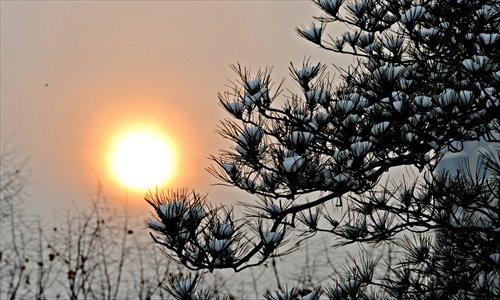The 15-day health plan
Editor's note
The ancient Chinese created an agricultural solar system - still in use today - that is based upon their observation of crops, climate, astrology, and the study of animal and plant life cycles. The system guided farmers as to when to sow seeds and when to harvest them, and this system has now been in place for more than 2,000 years.
Today, with advances in science and technology, agriculture depends less on this ancient wisdom. But this seasonal calendar still operates as a reference guide for gourmands to seek out the best times for seasonal delicacies and for health experts to plan nutritious diets.
In a single year, the system features 24 "solar terms," each lasting one day and occurring every two weeks. Each has its own name and characteristics. The Global Times is presenting a weekly series examining which foods and delicacies are best enjoyed during these periods, as well as tips on preserving general health.

Chinese people traditionally count nine-day periods after the Winter Solstice, the 22nd solar term which fell on December 21 this year. One folk song goes: "yijiu erjiu bu chu shou, sanjiu sijiu bing shang zou, wujiu liujiu yan he kan liu," which means that during the first two nine-day periods people are reluctant to expose their hands to the cold air, while during the third and the fourth nine-day periods people will "have to walk on icy roads." The song points out that during the fifth and sixth nine-day periods the weather turns warmer, and the "willow leaves begin to come out."
The 15-day winter solstice witnesses the occurrence of yijiu and erjiu, which are seen as the beginning of the coldest days of the year. "To get more exposure to sunlight is recommended for people, especially older people during this period," said Xiong Anling, a 72-year-old TCM (traditional Chinese medicine) practitioner from the TCM pharmacy chain store Tong Han Chun Tang (20 Yuyuanxin Road).
Exposure to sunlight
The ultraviolet rays in sunlight are said to help alleviate allergic rhinitis, rheumatic arthritis and bronchial asthma in susceptible people. Meanwhile, exposure to sunlight also stimulates the expansion of blood vessels and improves blood circulation, and which is also good for the skin. "From seven to nine o'clock in the morning and from four to six in the afternoon are the best times for exposure to sunlight," said Xiong.
According to Xiong, the persistent cold makes the maintenance and replenishment of "yang" energy a top priority for people in the winter. In TCM, for men this means nourishing the kidneys, while for women it is important to nourish their blood.
TCM highlights jie yu bao jing ("restraining sexual desire and nourishing the kidney essence") for middle-aged people in winter. This is in line with a TCM book from the Yuan Dynasty (1279-1368) called Taiding Yangsheng Zhulun which suggests that people in their thirties should have sex once every eight days, people in their forties every 16 days, and those in their fifties once every 20 days. By abiding by these rules, it is said that people's kidneys are strengthened and that they are more likely to live longer lives.
Meanwhile, maintaining a positive outlook on life, and avoiding working overtime is also suggested during winter.
Fruits such as apples and kiwi fruit are highly recommended in winter, while bananas and pears which are said to be "cold" in nature should be eaten in moderation.
Medicinal soup
Winter tonics are highly recommended by Xiong. "TCM tonics are recommended in winter because, on the one hand the temperature is low enough to store the medicine safely and on the other hand the body can make the best use of this medicine because of its high consumption of energy during winter," he said. "But today, refrigeration makes it possible to store TCM tonics in every season."
Xiong recommends a medical soup for people who want to nourish their "yang" energy during the coldest days of the year: mutton soup with ginger and Chinese angelica. The three main ingredients it contains are all "warm" in nature, while Chinese angelica is helpful for nourishing the blood and stimulating the blood circulation. Ginger, meanwhile, helps to alleviate coughs.
The Global Times has found a do-it-yourself recipe to enjoy this nourishing soup at home.
Ingredients: 500 gram mutton, 20 gram ginger, 20 gram Chinese angelica, 50 gram cooking wine, 10 gram spring onion, 5 gram salt, 5 gram MSG
Method:
Slice the ginger, and cut the spring onion into one-inch pieces
Steep the mutton in boiled water on a high heat for one minute, scoop out the mutton and cut it into small chunks
Heat 2 liters of water in a pot, add the mutton, ginger slices, spring onions and Chinese angelica, and heat until the water boils
Add the cooking wine into the pan, lower to a low heat and simmer for 2 hours
Add salt and MSG to taste, and serve